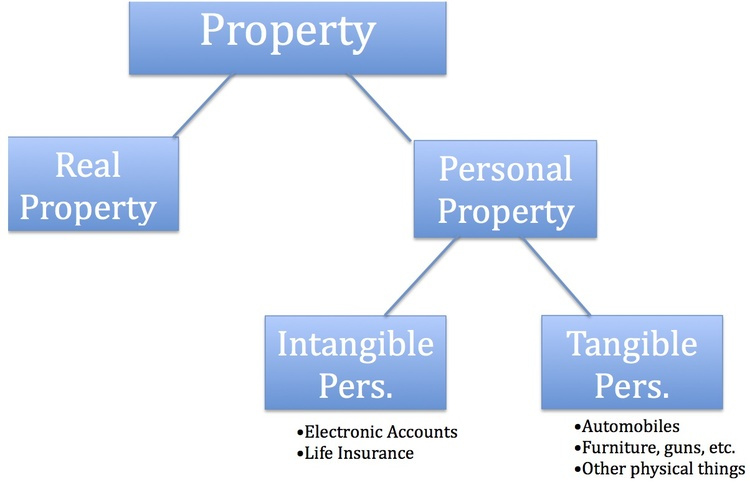Probate is a court process whereby the court oversees the administering of the decedent’s estate. Probate is meant to give the decedent’s creditors a chance to make a claim on the decedent’s property, and then to clear the title after the creditors have had sufficient notice and time to respond (usually 4 months). The probate process generally requires a lawyer’s assistance and several months of time, occasionally longer. For that reason, many people use Revocable Living Trusts (RLT) to bypass probate. And while a RLT is beneficial to many people, a RLT can be costly to settle and may not be worth it for other people. I am going to tell you how an Oregon resident can avoid probate without the use of RLTs.
Property is categorized into two major subsets: real property and personal property. Personal property is further divided into two subsets: tangible and intangible personal property. (See below.)

REAL PROPERTY
There are two options to bypass probate with real property: by using Small Estate Proceedings, and by using a Transfer on Death Deed.
Small Estate Proceedings. If a decedent’s real property is worth less than $200,000 and his personal property is worth less than $75,000, his heirs may initiate a small estate proceeding. This is a simple process that is meant to be done without the help of a lawyer. This process can be done regardless of whether the decedent had a Will or not. The heirs file a small estate affidavit (available online at the county court’s website) with the court, and follow simple directions. Something to be aware of is that any creditor of the decedent has four months to place a lien on the inherited property.
Transfer on Death Deed. The Oregon legislature has recently enacted a law that permits real property to be transferred on death without probate, by using what’s called a Transfer on Death Deed (TODD). A TODD is similar to a warranty deed, but contains language that permits the beneficiaries of the deed to take title upon the grantor’s death. A TODD can be used for real property of any value. The beneficiaries take the title subject to any mortgage or other lien on the property. The largest drawback is that creditors of the decedent may have up to 18 months to place a lien on the property. Because of this 18 month timeframe, the beneficiaries may have a difficult time selling the property within that timeframe. However, if the beneficiaries do not plan on selling the property within 18 months, this probably isn’t going to be much of a drawback.
PERSONAL PROPERTY
Intangible Personal Property. Intangible personal property includes bank accounts, investment accounts, retirement accounts, life insurance policies, etc., and can easily be passed to predesignated beneficiaries through using transfer on death designations. Generally all investment and retirement accounts and life insurance policies can bypass probate through the use beneficiary designations, and most bank accounts can also bypass probate by using pay-on-death designations (similar to transfer-on-death designations used by investment and retirement accounts and life insurance policies).
Tangible Personal Property. Tangible personal property consists of your “stuff”, such as furniture, automobiles, boats, electronics, etc. Automobiles can avoid probate by the heirs using an affidavit of heirship, accessible from the DMV website. It is a simple affidavit that the heirs complete, and then the DMV changes title. As long as your other tangible personal property is worth less than $75,000, your heirs can file a small estate affidavit (described above), and take the remaining tangible personal property without filing probate.
CONCLUSION
Avoiding probate without using a revocable living trust is possible and beneficial for some people, but is not for everybody.


